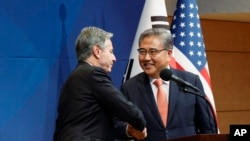U.S. Secretary of State Antony Blinken held talks in South Korea on Thursday on growing military ties between North Korea and Russia, while he maintained efforts to broker humanitarian pauses in the Israel-Hamas war and long-term solutions for Gaza.
Blinken arrived in South Korea on Wednesday after a meeting in Japan of G7 foreign ministers.
As a group, they called for pauses in the fighting between Israel and the Palestinian militant group Hamas to allow humanitarian aid to reach civilians in Gaza after a month of bombardment and increasing ground operations by Israel's military.
Blinken's two-day visit to South Korea is the first by a U.S. secretary of state in 2½ years and part of a broader Asia trip that will include a stop in India. He was in the Middle East before Japan.
The United States remains focused on the Indo-Pacific despite other global challenges, Blinken told a press conference in Tokyo on Wednesday, saying the U.S. was capable of "running and chewing gum at the same time."
Blinken met South Korea's national security adviser, Cho Tae-yong, and condemned "provocative actions" by North Korea on the peninsula and North Korea's sending of munitions and other supplies to Russia, the U.S. State Department said.
Blinken is expected to meet South Korean President Yoon Suk Yeol before talks with Foreign Minister Park Jin later on Thursday.
Close allies the United States, South Korea and Japan have condemned what they say is the flow of arms and military equipment from North Korea to Russia, saying movements of cargo from the reclusive state to Russia was evidence.
North Korea and Russia have denied any arms deals though their leaders pledged closer military cooperation when they met in September in Russia's far east.
Blinken's visit comes ahead of trip by U.S. Defense Secretary Lloyd Austin this weekend and an annual meeting with South Korea's defense minister on Monday in which they are expected to discuss upgrading the so-called extended deterrence strategy, or the use of U.S. strategic military assets including its nuclear forces to protect allies against attacks.





